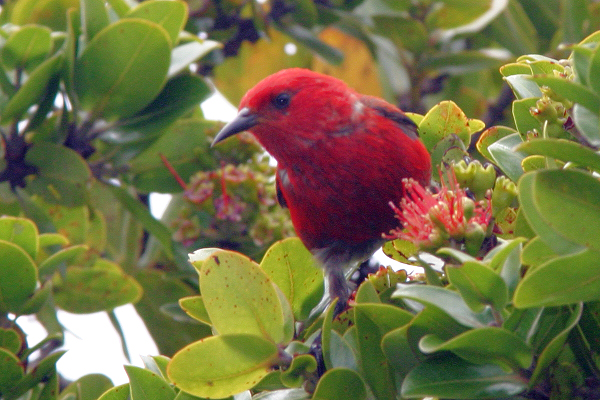
Location: Kaua'i, Hawaii
Date: 2005-07-17
Lens: Canon 300mm IS F4 + 1.4x II Converter

 'Apapane
Himatione sanguinea
'Apapane
Himatione sanguinea
 Description
DescriptionThe 'Apapane is the most abundant species of the Hawaiian honeycreeper family. The main food source for the 'Apapane is the nectar from the 'Ohia flower. Although primarily nectavorous, the diet of the �Apapane also includes a variety of insects, such as spiders, grasshoppers, and caterpillars. The 'Apapane has a variety of distinctive songs (10+) and calls (6+) that vary among habitat and island locations. Both male and female sing throughout the entire year; although the female does not sing while on the nest.
General: 5.25 inches in length. Sexes similar.
Adult: Crimson-red upperparts and breast. Bright crown. White belly and undertail coverts. Black legs, wings, and tail. Dark, slightly decurved bill.
Immature: Similar to adult, except the red plumage is replaced with pink and dull dark brown.
Mesic and wet forests at elevations above 1,000 meters Hawai'i, Maui, and Kaua'i. Locally common at higher elevations on O'ahu. Endemic to the Hawaiian islands.
 Nesting
Nesting2-4 white eggs with reddish markings. The eggs have an 13-14 day incubation period. Fledging occurs in ? days. The nest is a cup made from twigs, moss, ferns, rootlets, and lichens. It is built in the crown of an 'Ohi'a tree, tree fern, or in a lava tube.